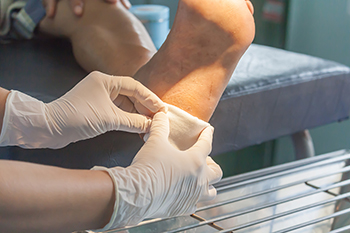
Puncture wounds on the foot occur when a sharp object, such as a nail or splinter, penetrates the skin and underlying tissues. These injuries can lead to localized pain, swelling, and redness at the site of the puncture. In some cases, infection can develop, resulting in increased pain, pus, and fever. The presence of a foreign object may not always be visible, making proper diagnosis important. A podiatrist will typically perform a thorough examination, possibly including X-rays or other imaging tests, to determine the extent of the injury and whether any debris remains embedded. Timely treatment is essential to prevent complications. If you have sustained a puncture wound on your foot, it is suggested that you consult a podiatrist who can successfully treat this condition.
Wound care is an important part in dealing with diabetes. If you have diabetes and a foot wound or would like more information about wound care for diabetics, consult with Jill Scholz, DPM from Town Square Family Foot Care. Our doctor will assess your condition and provide you with quality foot and ankle treatment.
What Is Wound Care?
Wound care is the practice of taking proper care of a wound. This can range from the smallest to the largest of wounds. While everyone can benefit from proper wound care, it is much more important for diabetics. Diabetics often suffer from poor blood circulation which causes wounds to heal much slower than they would in a non-diabetic.
What Is the Importance of Wound Care?
While it may not seem apparent with small ulcers on the foot, for diabetics, any size ulcer can become infected. Diabetics often also suffer from neuropathy, or nerve loss. This means they might not even feel when they have an ulcer on their foot. If the wound becomes severely infected, amputation may be necessary. Therefore, it is of the upmost importance to properly care for any and all foot wounds.
How to Care for Wounds
The best way to care for foot wounds is to prevent them. For diabetics, this means daily inspections of the feet for any signs of abnormalities or ulcers. It is also recommended to see a podiatrist several times a year for a foot inspection. If you do have an ulcer, run the wound under water to clear dirt from the wound; then apply antibiotic ointment to the wound and cover with a bandage. Bandages should be changed daily and keeping pressure off the wound is smart. It is advised to see a podiatrist, who can keep an eye on it.
If you have any questions, please feel free to contact our office located in Coralville, IA . We offer the newest diagnostic and treatment technologies for all your foot care needs.